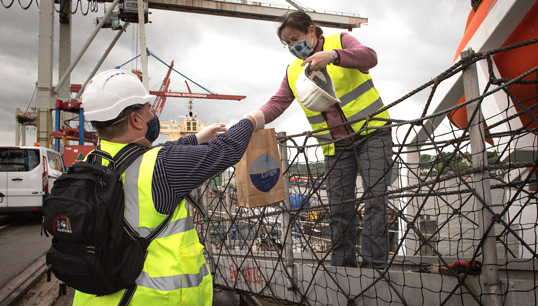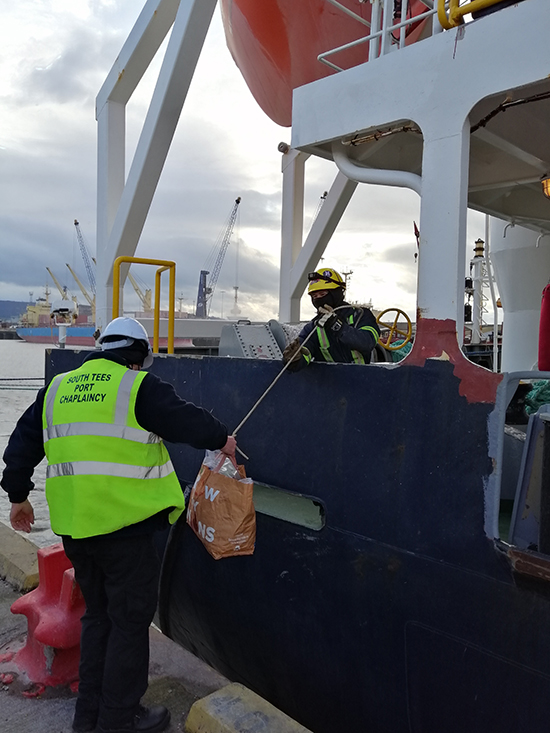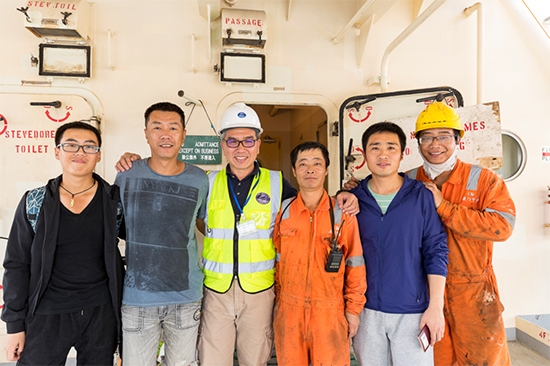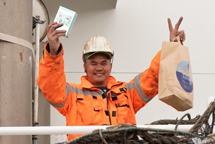- Topics
- Campaigning
- Careers
- Colleges
- Community
- Education and training
- Environment
- Equality
- Federation
- General secretary message
- Government
- Health and safety
- History
- Industrial
- International
- Law
- Members at work
- Nautilus news
- Nautilus partnerships
- Netherlands
- Open days
- Opinion
- Organising
- Podcasts from Nautilus
- Sponsored content
- Switzerland
- Technology
- Ukraine
- United Kingdom
- Welfare
Respond, recover reset: maritime charities adjust their barometers post-pandemic
9 August 2021

Many stories of resilience, collaboration and rapid change are emerging from the maritime charities sector – but Covid-19 may be having a long tail effect on more than just health. Deborah McPherson investigates
The first results from the Covid-19 Voluntary Sector Impact Barometer, set up over a year ago, showed the initial devastating impact of the pandemic on voluntary organisations, with two in five (39%) charities and community groups reporting a deteriorating financial situation.
Since then, the Barometer has shown the voluntary sector is demonstrating extraordinary resilience as charities have found innovative ways to stay afloat financially while meeting the need for more help. 91% of voluntary sector respondents reported many services had now moved online because of Covid-19, and the financial outlook has slowly also become more optimistic as charities found innovative ways to meet demand for their services.
The Barometer is a part of a major study using real-time data to explore how voluntary organisations are being impacted by Covid-19 in monthly snapshot reports. Researchers are concurrently tracing over 300 voluntary organisations and conducting in-depth interviews to see what is really going on 'behind the headlines'.
Now there are also plans to create a parallel barometer study and dashboard specifically for maritime charities, in a project spearheaded by the Maritime Charities Group (MCG) and being carried out by the same research bodies.
Lessons learnt
Ahead of that project, what lessons can maritime charities learn from the existing voluntary sector study?

Professor of Organisation Studies at Nottingham Trent University and voluntary sector project lead Daniel King explains: 'Our research is confirming some organisations have struggled with Covid and others actually have done quite well. Some organisations have received more funding than they ever thought possible, or they've been able to access grants. Lots of organisations have really adapted. People have also talked about the pace of change – doing 10 years' worth of innovation in one year, around digitalization for example.'
But there are now worries about a potential 'long Covid for charities', says Dr King. 'There was a lot of funding in the last financial year, but now there is concern about the long term implications, the impact on staff who are often exhausted, and the demand is still going up.'
Maritime Charities Group (MCG) manager Ben Gibbons agrees the pandemic has 'forced some new ways of working, to meet the rapid and escalating changes to the needs of the beneficiaries for whom we work.'
The MCG's 10 seafaring charity alliance members came together to work quickly to provide help to those most in need, says Mr Gibbons. 'We began to see cases of need increase as seafarers used up their credit and coping with consequent debt became a high priority. In the first few months MCG members committed over £6 million in grants to counter the effects of Covid-19.
'Fortunately, most charities were able to reallocate funds and draw down reserves for Covid related relief. However, the downside is that MCG Members and the charities they support have had to re-assess their usual priorities.'
The Mission to Seafarers' director of advocacy, Ben Bailey, summarises the experiences of several maritime charities with chaplaincy and seafarer centre services: 'It was a huge challenge in adapting our services, quickly and efficiently, as well as offering new services in response to the pandemic.'
Stella Maris chief executive officer Martin Foley said as well as quickly adapting the way it provided support to crew arriving in port − moving from face-to-face ship visits to using social media and other digital means − the charity also saw increased calls for assistance from seafarers, ship managers and insurers on bigger issues such as support for crew following deaths, suicides or to help stranded crews.
Collaborating to support seafarers globally
One of the key initiatives for the MCG has been the launch of a redundancy and retraining bursary scheme to help merchant seafarers who have been made redundant or who lost their contract due to the pandemic. The scheme − funded by donations from Trinity House, Merchant Navy Welfare Board (MNWB) and the Nautilus Slater Fund − totalled £40k. So far over 50 UK-based merchant seafarers have benefitted.

CEO of The Seafarers' Charity Catherine Spencer says at the beginning of the pandemic the charity could see there would be an increased demand for support as well as a decrease in fundraising. So it took the decision to release an additional £2m from its reserves to provide a Covid-19 Emergency Fund to help maritime welfare charities cope with the impact of the pandemic – a decision she admits 'caused the workload of our Grants Committee to triple'.
An additional £1.5m in grant funding was awarded to maritime welfare charities and the fishing community for a broad range of needs in both the UK and internationally, Ms Spencer points out.
'We were able to provide grants to support seafarers' centres that had been locked down and unable to earn a trading income during the pandemic.'
Sailors' Society CEO Sara Baade agreed the pandemic has encouraged some 'fantastic collaborative projects' such as the Seafarers' International Relief Fund which had enabled the charity to help provide Covid-19 medical kits for thousands of Indian seafarers and their families
Fundraising challenges in lockdown
Fundraising was challenging during lockdown for many charities. Ms Spencer says: 'The landscape changed dramatically and became volatile and more uncertain. Along with other charities our fundraising took a hit – most noticeably through the wholesale cancellation or postponement of events which we rely on for fundraising,' she says.
'Delays to probate also resulted in legacies being delayed for months. However, thanks to our amazing supporters our initial Covid-19 Emergency Appeal was our most successful in several years.'
As physical events were unable to take place, The Seafarers' Charity along with other charities embraced the world of virtual fundraising. It held its first virtual Maritime Quiz in January 2021 hosted by UK MP and former maritime minister Nus Ghani, which was supported by over 170 attendees. 'The event was so well received we organised another one the following month,' added Ms Spencer. 'We have continued to explore digital fundraising events – in July this year, we successfully launched our first Facebook event called the 400,000 Steps Challenge in recognition of the 400,000 seafarers who have been stranded at sea.'
As for Sailors' Society, Ms Baade says 'In terms of fundraising, face-to-face fundraising events were "off", but it was great to see so many embrace virtual events as an alternative and come up with new ways to fundraise, like the Virtual London Marathon. Our emergency appeals also had fantastic support and we're so grateful to everyone who contributed. '
The Mission to Seafarers frontline operations were affected by loss of income due to the pandemic and shore leave being restricted or denied, said Mr Bailey. But he said the support from the industry and trust funders through The Mission's successful rapid welfare relief Flying Angel Campaign had raised an impressive £680K in the summer of 2020. Community supporters also rallied with many people taking part in their own individuals challenges as part of The Mission's Global Champions Unite, raising £70K in three months.
Innovations out of adversity
One of The Mission to Seafarers' innovations was setting up a new Digital Chaplaincy service (Chat to a Chaplain) in April 2020 as access to seafarers in port became restricted, says Mr Bailey. The chaplaincy service had attracted important funding from The Seafarers Charity and the Marine Society.
'The Mission also supported 1,426 justice and welfare cases throughout 2020, including a number of significant abandonment cases. We helped 1,688 families through our emergency family feeding programme in Tuticorin and supported seafarers who found themselves trapped in ports during, as a result of the pandemic.'

As well as severe restrictions on ship visiting, local regulation and lack of shore leave forced the closure of most of the Mission's seafarer centres and transport operations. Mr Bailey said at one point, less than 40% of ports were open to them but this has now risen to 65% and is increasing, often following 'significant local advocacy', and charities have been able to carry out distanced visitation at the gangways to deliver personal shopping and medicines.
Ms Spencer said The Seafarers' Charity had also worked across the sector to increase support for maritime welfare charities to be able to innovate and develop more digital offerings, as well as increasing its own support reach via digitalisation. 'Our biggest innovation has been the Seafarers International Relief Fund, which has seen us working more closely across the sector to raise over $1 million initially for seafarers in India, but we are now accepting applications from to support seafarers in other countries suffering acute humanitarian need because of Covid-19.'
Positive impacts for mental health
Ms Baade notes that from the Sailors' Society perspective, one key positive of the pandemic so far has been the opportunity to put the spotlight firmly back on seafarer mental health and wellbeing.
'Caring for people’s mental health and wellbeing, as well as offering financial support, have both been priority areas for us the past 18 months, alongside our usual activities,' said Ms Baade. 'We saw 12 times as many requests for financial assistance last year and hundreds of calls made to our helplines.'
As a result, the Society had stepped up its wellness work, such as the launch of its free Wellness at Sea Awareness Campaign, and it also runs dedicated mental health awareness, stress management and family resiliency sessions for seafarers on shore, their families, and communities in the Philippines.
Senior programme manager at the Lloyd's Register Foundation Dr Olivia Swift explains that the Foundation, which focuses on the safety of critical infrastructure rather than welfare support for seafarers specifically, is active in advocating for and supporting long-term improvement in seafarers' psychological wellbeing. It funded a project carried out by NTU which led to the publication in November 2020 of the Psychological Wellbeing and Safety in a Global Context report. This recommended organisations prioritise good mental health support when evaluating safety practices in the workplace in response to Covid-19.
In June last year MCG also launched the Mental Health Awareness and Wellbeing Training Standard which sets out a framework for training in mental health and wellbeing that is tailored to the needs of seafarers and has been widely adopted by training providers and commissioners.
One reason why those seafarers contacted our chaplains is because they had experienced small acts of kindness and hospitality from us before the pandemic – and those acts of kindness gave seafarers the confidence and trust to contact us when the difficult times arose. Martin Foley, chief executive officer Stella Maris

Increasing digital access
With less than 40% of seafarers having access to the internet in their vessels, the Mission to Seafarers made provisions for MiFi (individual Wi-Fi internet units) to be lent to ships by its chaplains to give seafarers vital internet access while they are in port.
Similar services are funded around the world by the ITF Seafarers Trust, for example across ports in Germany via the Deutsche Seemannsmission and German union ver.di international; and The Seafarer Connect project which is run by the Tas Bull Seafarers Foundation in Sydney, Australia. The Australian project uses briefcase sized units which can provide a strong and high-quality MiFi signal over a larger area than the small MiFi units other projects are using.
Image: A seafarer gives the thumbs up to the Wi-Fi units supplied by Deutsche Seemannsmission and German union ver.di. Image: Mauricio Bustamante 2020/ver.di
Looking ahead
The Voluntary Sector Impact Barometer highlights wider lessons around the pandemic on resilience, digitalization, and collaboration – many charities are applying what they have learned to their future work.
As restrictions ease Ms Spencer said The Seafarers' Charity plans to continue virtual events alongside 'real life' events and is 'building sustainable relationships with corporates whose values and mission align with our own.'
In the next year The Charity plans to use research and advocacy far more than in the past to improve the lives of seafarers. 'Every charity should be trying to make itself redundant,' adds Ms Spencer. 'We want our seafarers to thrive which means finding solutions to long-term problems which cause disadvantage and hardship. We're looking forward to working even closer with Nautilus on these issues.'
Ms Baade says it had been heartening for Sailors' Society to see so many in the industry addressing mental health. 'Taking positive action to support crews, whether providing free Wi-Fi or crew-care programmes, will continue to be a priority for us.'
She says that while there are some 'great vaccination programmes going on and access is becoming more readily available, recognising seafarers as key workers and giving them priority access to vaccines is essential for them to be able to carry out their job safely and to help the shipping industry recover.'
Mr Bailey says The Mission to Searfarers' Seafarers Happiness Index 'has been an important tool for the charity and the industry to understand the changing needs of seafarers, ensuring we could continue to adapt our services.'
The Mission is also currently working on a five-year global strategy to ensure it can continue to support seafarers where help is most needed. It was particularly committed to an increasing emphasis on a 'blended' operation 'to combine face to face and digital work appropriately', and securing new funding through the launch of its Sustaining Crew Welfare campaign.
A temperature check for maritime
The sheer pace of change and more fundamental questions about new ways of working are among some of the questions to be answered by the new maritime welfare charity study mentioned above, which is being planned by MCG.

Mr Gibbons explains the new survey on the impact of Covid-19 on the sector will initially run each month from September to December 2021.
The survey will be tailored to the specific and often unique challenges faced by all maritime charities during the 'unprecedented crisis of the global pandemic', says Mr Gibbons. 'It will provide a much needed "temperature check" on the maritime sector, and regular intelligence on emerging trends and important issues as they develop.'
'Reliable, regular data will help everyone in the sector understand the current and future needs of our seafaring beneficiaries as we recover from the covid-19 crisis. The more participants involved, the more impact this can potentially have for beneficiaries, maritime welfare charities and the entire sector.'
Tags
